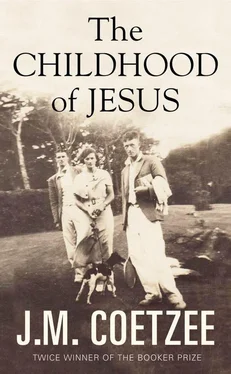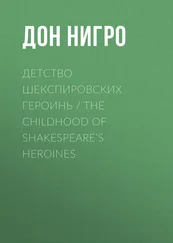‘I’m surprised to hear that. If two boys agree to call each other brother, they have started a brotherhood. It is as simple as that. They can round up more boys and make them brothers too. They can swear loyalty to one another and choose a name — the Brotherhood of the Seven Stars or the Brotherhood of the Cave or some such. Even the Brotherhood of David, if you like.’
‘Or it can be a secret brotherhood,’ interjects Daga. His eyes glint, he wears a little smile. The boy, who has barely listened to him, Simón, now seems quite transfixed. ‘You can swear an oath of secrecy. No one need ever find out who your secret brothers are.’
He breaks the silence. ‘That is enough for tonight. David, go and fetch your pyjamas. You have kept Diego waiting long enough. Think up a good name for your brotherhood. Then when you come back from La Residencia, you can invite Fidel to be your first brother.’ He turns to Inés. ‘Do you agree? Do you approve?’
‘Where is El Rey?’
The cart is standing at the quayside, empty, ready to be loaded, but El Rey’s place has been taken by a horse they have not seen before, a black gelding with a white blaze on his forehead. When the boy comes too close, the new horse rolls his eyes nervously and paws the ground.
‘Hey!’ Álvaro calls to the driver, who sits drowsing on his seat. ‘Where is the big mare? The youngster has come especially to see her.’
‘Down with horse flu.’
‘His name is El Rey,’ says the boy. ‘He’s not a mare. Can we visit him?’
A guarded look passes between Álvaro and the driver. ‘El Rey is back at the stables, resting,’ says Álvaro. ‘The horse doctor is going to give him medicine. We can visit him as soon as he is better.’
‘I want to see him now. I can make him better.’
He, Simón, intervenes. ‘Not now, my boy. Let us speak to Inés first. Then maybe all three of us can make a trip to the stables tomorrow.’
‘Better wait a few days,’ says Álvaro, and flashes him a look which he does not know how to interpret. ‘Let El Rey have a chance to recover properly. Horse flu is a nasty thing, worse than human flu. If you are sick with horse flu, you need rest and quiet, not visitors.’
‘He does want visitors,’ says the boy. ‘He wants me. I am his friend.’
Álvaro takes him, Simón, aside. ‘Better if you don’t bring the kid to the stables,’ he says; and, when he still fails to understand: ‘The mare is old. She has had her day.’
‘Álvaro has just had a message from the horse doctor,’ he reports to the boy. ‘They have decided to send El Rey to the horse farm so that he can get better more quickly.’
‘What is a horse farm?’
‘A horse farm is where young horses are born and old horses go to rest.’
‘Can we go there?’
‘The horse farm is out in the country, I’m not sure exactly where. I’ll make inquiries.’
When the men knock off at four o’clock, the boy is nowhere to be seen. ‘He went with the last dray,’ says one of the men. ‘I thought you knew.’
He sets off at once. By the time he gets to the grain store the sun is setting. The store is deserted, the great doors are locked. His heart beating fast, he searches for the boy. He finds him behind the store, on a loading platform, squatting beside the body of El Rey, stroking her head, waving the flies away. The stout leather belt that must have been used to hoist the mare is still around her belly.
He clambers onto the platform. ‘Poor, poor El Rey!’ he murmurs. Then he notices the blood that has congealed in the horse’s ear, and the dark bullet hole above it, and shuts up.
‘It’s all right,’ says the boy. ‘He is going to be well again in three days.’
‘Is that what the horse doctor told you?’
The boy shakes his head. ‘El Rey.’
‘Did El Rey tell you that himself — three days?’
The boy nods.
‘But it isn’t just horse flu, my boy. Surely you can see. He’s been shot with a gun, as a mercy. He must have been suffering. He was suffering and they decided to help him, to ease the pain. He is not going to get better. He is dead.’
‘No, he’s not.’ Tears are running down the boy’s cheeks. ‘He is going to the horse farm to get better. You said so.’
‘He is going to the horse farm, yes, but not to this horse farm, not to the horse farm here; he is going to another horse farm, in another world. Where he will not have to wear harness and pull a heavy cart but can stroll around in the fields in the sunshine eating buttercups.’
‘It’s not true! He is going to the horse farm to get better. They are going to put him on the cart and take him to the horse farm.’
The boy bends and presses his mouth to the horse’s vast nostril. Hastily he grips the boy by the arm and pulls him away. ‘Don’t do that! It’s not hygienic! You will get sick!’
The boy wrests himself free. He is weeping openly. ‘I will save him!’ he sobs. ‘I want him to live! He’s my friend!’
He holds the struggling boy still and clasps him tight. ‘My dearest, dearest child, sometimes those we love die and there is nothing we can do about it except look forward to the day when we will all be together again.’
‘I want to make him breathe!’ the boy sobs.
‘He’s a horse, he’s too big for you to breathe life into.’
‘Then you can breathe into him!’
‘That won’t work. I don’t have the right kind of breath. I don’t have the breath of life. All I can do is be sad. All I can do is mourn and help you to mourn. Now quick, before it gets dark, why don’t you and I go down to the river and look for some flowers to put on El Rey? He will like that. He was a gentle horse, wasn’t he, in spite of being a giant. He will enjoy arriving at the horse farm with a wreath of flowers around his neck.’
So he coaxes the boy away from the dead body, leads him to the riverbank, helps him pluck flowers and weave them into a garland. They return; the boy drapes the garland over the dead, staring eyes.
‘There,’ he says. ‘Now we must leave El Rey. He has a long journey to make, all the way to the great horse farm. When he arrives, the other horses will look at him with his crown of flowers, and they will say to each other, “He must have been a king where he came from! He must be the great El Rey whom we have heard about, the friend of David!”’
The boy takes his hand. Under a rising full moon they trudge back along the path to the docks.
‘Is El Rey getting up now, do you think?’ asks the boy.
‘He is getting up, he is shaking himself, he is giving that whinny of his that you know, he is setting off, clop-clop-clop, towards his new life. End of weeping. No more weeping.’
‘No more weeping,’ says the boy, and perks up, and even gives a jaunty little smile.
He and the boy share a birthday. That is to say, because they arrived on the same boat on the same day they have been assigned as their birth date the date of their joint arrival, their joint entry into a new life. The boy was deemed to be five years old because he looked five years old, just as he was deemed to be forty-five (so his card says) because that was how old he looked on that day. (He had been piqued: he had felt himself to be younger. Now he feels older. He feels sixty; there are days when he feels seventy.)
Since the boy has no friends, not even a horse friend, there is no point in holding a birthday party for him. Nonetheless, he and Inés are agreed that the day should be properly celebrated. So Inés bakes a cake and ices it and plants six candles on it, and they secretly buy him gifts, she a sweater (winter is around the corner), he an abacus (he is worried about the boy’s resistance to the science of numbers).
Читать дальше












